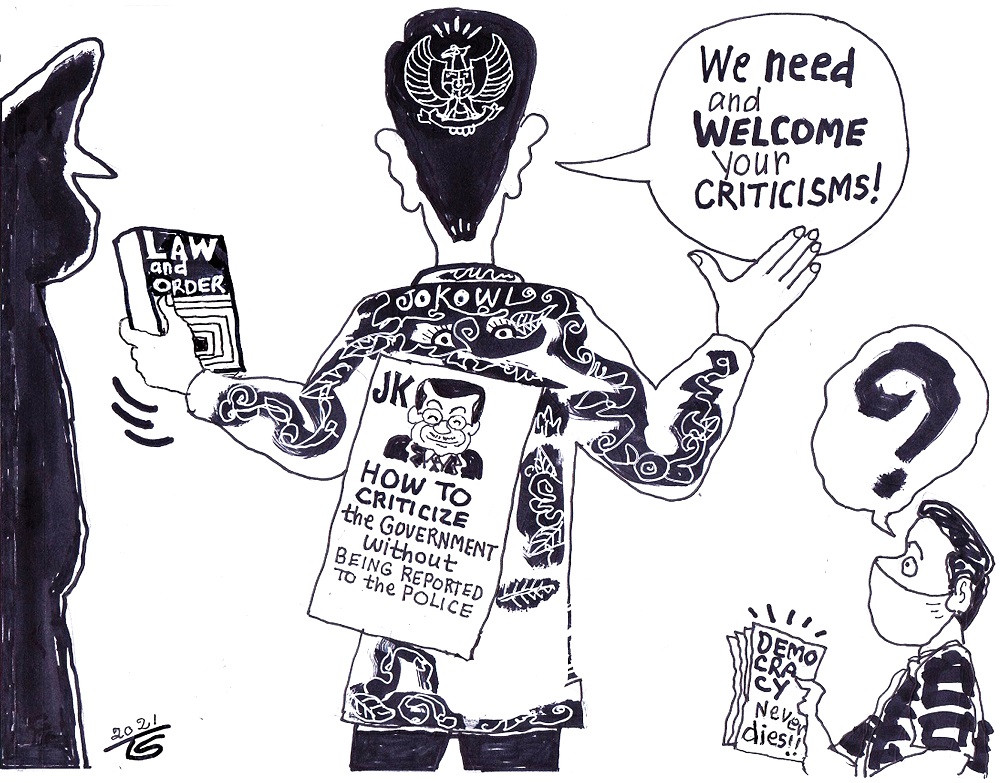Popular Reads
Top Results
Can't find what you're looking for?
View all search resultsPopular Reads
Top Results
Can't find what you're looking for?
View all search resultsSilencing Jokowi’s critics
But unlike in the New Order, the oppression of government critics today involves citizenry.
Change text size
Gift Premium Articles
to Anyone
W
hen an antigovernment critic died in police detention and when 141 suspects are waiting for their trials merely because they expressed their dislike for or opposition to the government, there is no doubt the country is moving to revive the authoritarian past. But unlike in the New Order, the oppression of government critics today involves citizenry, who readily jump to the defense of President Joko “Jokowi” Widodo.
Marking the democratic regression is the enforcement of the law to silence the detractors and the active role of buzzers in bullying, intimidating and doxing anyone who they accuse of slapping the government’s face. Law No. 11/2008 on Electronic Information and Transactions (ITE) has become an effective instrument to criminalize critics, as most dissent has been articulated in cyberspace.
According to Amnesty International Indonesia, there have been 119 cases of violation of the draconian law with 141 suspects, including 18 activists and four journalists. Ironically, the police actions and the bullying on the internet against the suspects have won praise, especially from Jokowi supporters. Some of them even “celebrated” the tragic death of government critic Maher recently.
Responding to the growing public ire against the enforcement of the cyberlaw by the police and other law enforcement agencies, a move which many say will stifle freedoms, President Jokowi recently raised the idea to revise the ITE Law. The House of Representatives has agreed to deliberate the revision. But the issue does not concern the revision itself, because there is no guarantee the new law would do better to ensure freedom of speech and expression.
The cyberlaw was once revised in 2016 but without substantial changes. It still punishes anyone found guilty of distributing, transmitting or making accessible electronic contents containing insults, pornography, hate speech, hoaxes and threats. Some of the articles are so “elastic” that they are open to multiple interpretations, giving the police free hands to make a decision as they wish. As the police fall under the President’s auspices, unsurprisingly they act in favor of the head of state.
Many have also doubted Jokowi’s sincerity in accepting criticism, because the rampant harassment, cyberattacks, detention and imprisonment of critics by the police could not happen without his knowledge. In fact, the National Police’s cyberforce has been aggressively conducting surveillance of government critics to an alarming level.
It is just ironic that the Jokowi government is threatening social media freedom, which has helped him rise to fame and catapult him to power.
While it is true that digital literacy among the public remains low and therefore has made it easy for hoaxes, hatred, smears and slander to circulate online, the police’s choice of a hard approach only emulates the New Order’s penchant for security and order at the expense of freedoms.
A concerted effort to improve internet literacy is all that we need, rather than restricting civil liberty. A combination of education and willingness of the government to accommodate public grievances is a must.
As Jokowi himself admits, the internet should be a safe place for everyone to express their opinions, including in criticizing him.










